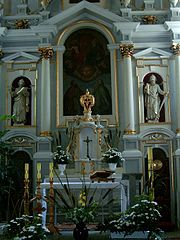
A History Of The Mass And Its Ceremonies In The Eastern And Western Church -Rev John O'Brien A.M.
APPALLING PUNISHMENTS WITH WHICH ALMIGHTY GOD SOMETIMES VISITS THE PROFANERS OF THE SACRED VESSELS AND VESTMENTS OF THE ALTAR
The Old Testament is full of examples that show how indignantly Almighty God takes the slightest disrespect shown to any of the sacred vessels used in his service. Look at the history of the Ark of the Covenant, and see what miracles were wrought in testimony of its sanctity. First, it is captured by the Philistines, and insult is offered it by being brought into the temple of Dagon; but it has scarcely entered when Dagon falls to the ground (1 Kings 5), and for the indignity offered it, the whole city of Azotus is severely punished. The Gethites carry the Ark about from one place to another, and wherever it entered the mortality was so fearful that, as the Scripture says, “The fear of death was in every city” (ibid.) Then, again, look at the sorrowful example made of the Bethsamites. For looking with curiosity into the Ark as many as fifty thousand of them were slain (ibid. cap. 6) But the most appalling example of all is that recorded of Heliodorus in the second book of Machabees, chap. 3. This infamous man, to gratify the wishes of Seleucus, son of Antiochus the Great, set out for Jerusalem in order to plunder the Temple of its valuable treasures. Onias, a very saintly man, was High-Priest at the time. All that could possibly be done by prayer and earnest entreaty was done on that occasion to hinder Heliodorus from persisting in his wicked design, but to no purpose. He entered the Temple, and was about to lay hands upon the sacred treasures, when lo! the judgment of God fell upon him. “There appeared,” says the sacred text, “a horse with a terrible rider upon him, adorned with a very rich covering: and he ran fiercely and struck Heliodorus with his fore-feet, and he that sat upon him seemed to have armor of gold. Moreover, there appeared two other young men beautiful and strong, bright and glorious, and in comely apparel: who stood by him, on either side, and scourged him without ceasing with many stripes. And Heliodorus suddenly fell to the ground.” These are but a few of the many others that are found here and there in the Old Testament, where we see the malediction of God visiting the profaners of His sacred temple. Those furnished by historians and annalists of the Christian Church are in nowise less astounding.
It is well known, for instance, how, when the Donatists broke down the altars of the early Christian churches and cast the Blessed Eucharist to the dogs, the latter turned upon the wicked wretches themselves and tore them to pieces. St. Gregory of Tours tells us of an English nobleman who entirely lost the use of his feet on account of having dared to wash them in a Paten which he had brought from a neighboring church (Kozma, 85, note 17). But what Theodoret relates in his third book, chap. xii., of the soldiers of Julian the Apostate is the most appalling that could be recorded. There was at that time a very beautiful church at Antioch, called the “Golden” from its wonderful magnificence. Its valuable treasures were immense, and all the donation of Constantine the Great. Julian sent two of his men to plunder this church and bring the spoils to himself. They obeyed his commands; but mark the result. Not content with desecrating the sacred house itself, one of them ascended the main altar and defiled it in a most shameful manner, while the other kept crying out in blasphemous derision: “Behold what fine vessels they use in the worship of the Son of Mary!” Divine vengeance in an instant overtook both of them. The first was seized with an ulcer which turned his inside to putrefaction, so that he died vomiting his bowels through his blasphemous mouth. The other was taken with a violent hemorrhage, which continued without interruption until all the blood in his body had been drained off; then he expired amidst the most excruciating pains. This dire occurrence is also related by Protestant historians. Another singular visitation of God is related by Victor Uticensis in his work on the Vandal persecutions (lib. i. p. 593). This historian tells us that a man named Proclus, agent of one of the Vandal kings, once entered a Christian church, and, having stripped the altar of its sacred coverings, converted them to his own private uses. He made himself shirts of some of the coverings and drawers of others; but the very instant he put them on he was seized with so frightful an attack of mental delirium that he died biting his tongue off.
These examples are sufficient to show how inviolable and sacred the smallest article of the sanctuary is held in the eyes of Almighty God.

 Support Site Improvements
Support Site Improvements